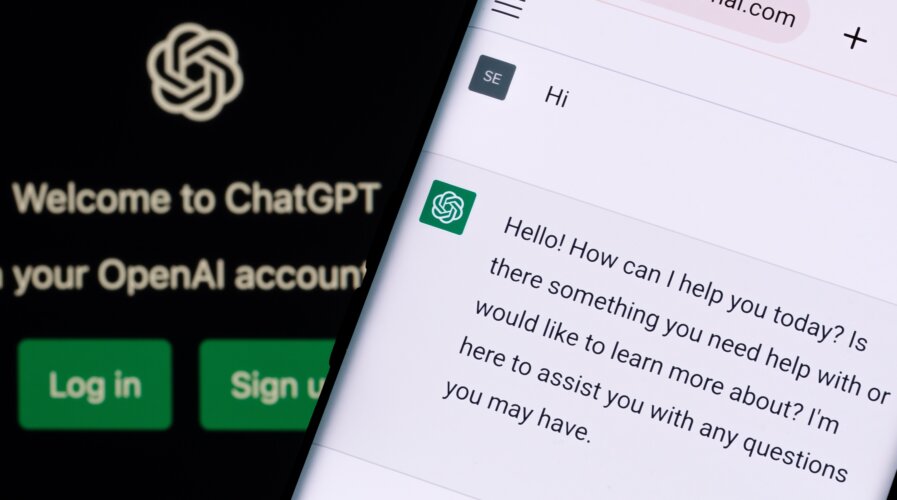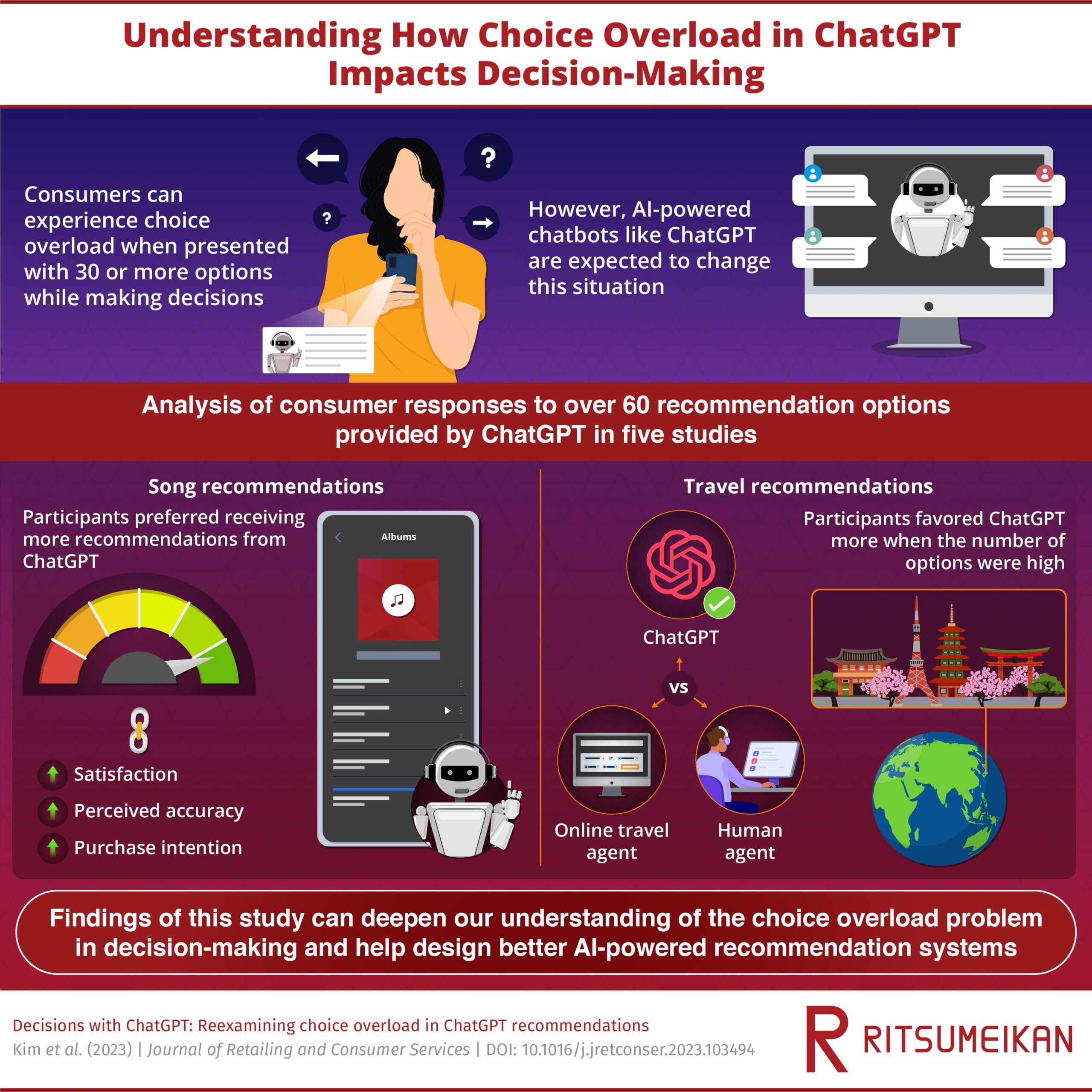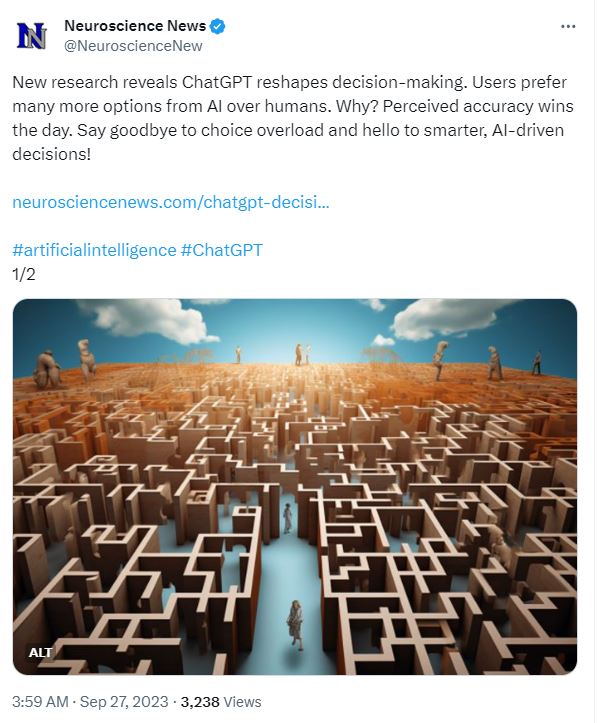
ChatGPT is becoming an important decision making tool. (Image – Shutterstock)
Is ChatGPT enabling collaborative decision-making or merely Hobson’s choice?
- ChatGPT is becoming an important collaborative decision making tool.
- ChatGPT helps deal with choice overload.
- Research shows users prefer the options they get from ChatGPT.
Tired of making decisions? Tired of planning what to eat or what to watch? Or even just tired of texting someone? Well, all these decision-making problems are slowly being solved with generative AI.
Today, one can get ChatGPT or any other similar generative AI chatbot tool to plan everything for them. Be it their schedule for the day, their meetings at work or even replying to emails, generative AI has made it possible for collaborative decision-making.
When prompted, tools like ChatGPT are capable of generating the potential solution. At work, Google and Microsoft have updated their office tools to make it easier for employees to focus more on important work. For example, an employee could use Google Bard to reply to his emails, attend his meetings and even summarize what happened in the meeting.
Other use cases see generative AI tools analyzing and summarizing scenarios and providing solutions and recommendations to the problem. For example, in a manufacturing plant, the technology can alert a supervisor of potential faults and get them fixed. This not only saves time but also avoids any disruptions.
Put simply, decision-making is becoming a collaborative effort with generative AI. All we need to do nowadays is give technology an instruction and our route is mapped out, day planned, evening sorted.
While this is fascinating, there are also concerns that we are becoming too reliant on technology today. If ChatGPT is capable of planning holidays, work schedules and other stuff, is the process really collaborative decision-making or is it just limiting our options to what we can or cannot do in a day?
For example, when prompting ChatGPT to plan a holiday, the tool will plan the trip based on its input of what it feels is the perfect holiday. However, what the technology perceives as the perfect holiday may not exactly be what the user wants. And this is where another problem can arise – choice overload.
The ‘choice overload’ phenomenon occurs when a person is overwhelmed by the number of options while making decisions. When consumers experience choice overload, they often find it challenging to decide, fearing that they might make the wrong one. In many cases, this can result in decreased satisfaction with the chosen option, which is counterproductive in most contexts.
But do users experience a similar choice overload when a chatbot like ChatGPT is the one providing multiple options?

Collaborative decision making being enabled by ChatGPT.
From collaborative decision-making to choice overload
Scientists from Japan have been investigating the impact of choice overload in recommendation options generated by ChatGPT. Given the technology’s role in society today, tools like ChatGPT rely on their pre-training on large amounts of data, especially when it comes to generating highly personalized recommendations, considering factors like user’s interests, browsing history, and preferences.
The researchers from Japan feel that chatbots will soon take the cyberworld by storm and make their way into daily life decision-making, across industries such as retail, manufacturing, finance, tourism, and customer service. Thus, understanding how consumers perceive their responses is just as important as the responses themselves.
The research team led by Professor Changju Kim from the College of Business Administration, Ritsumeikan University, Japan, conducted a detailed study to investigate how the problem of choice overload impacts ChatGPT users and its impact on their decision-making process.
“Despite their advantages, chatbots like ChatGPT also have certain limitations, such as those associated with privacy, information transparency, and incorrect information. Moreover, little is known about how ChatGPT influences consumer decision-making. To shed light on this aspect, we decided to analyze consumers’ responses to a relatively large number of options suggested by ChatGPT,” said Prof.Kim.
In traditional decision-making, about 24 to 30 options are enough to induce choice overload. However, the research team theorized that the negative effects associated with such a large number of options would decrease if they were generated by ChatGPT, given its ability to provide highly personalized and accurate recommendations.

ChatGPT helping deal with Choice overload.
Is too many options a bad thing?
To be sure of their hypothesis, five independent studies were conducted to analyze consumers’ responses to the recommendation options provided by ChatGPT. In the first two studies, participants received song recommendations and were asked to assess their perceived satisfaction, accuracy, and intent to purchase.
In the other three studies, participants received suggestions on places to visit during a hypothetical trip to Kyoto, Japan. These studies not only focused on the number of options but also considered the source of the suggestions. Participants were then asked to respond to these recommendations by rating their satisfaction, perceived accuracy, and intention to visit the recommended place.
Interestingly, the researchers found that participants preferred a large number of recommendation options, such as 60 or 70, from ChatGPT. Their satisfaction and intent to purchase increased with the number of options because they perceived the information provided by the chatbot to be accurate.
Moreover, participants preferred receiving many suggestions from ChatGPT, compared to those from a human or an online travel agent. These findings suggest that the nature of the recommendation agent greatly influences the number of options preferred by a consumer.
It’s not really Hobson’s choice
While some may feel that the collaborative decision-making process is limited by ChatGPT, the reality is that the findings prove that many still prefer to have technologies to assist them in their decision-making process.
In fact, decision-making fatigue no longer becomes an issue as most of the research work is done. All they need to do is decide what they want to do with the choices presented to them.
The researchers also believe that the findings can have important implications for real-world applications. For instance, businesses can leverage the perceived accuracy of the information provided by ChatGPT and provide consumers with multiple options, without the fear of negatively impacting their decision-making. In turn, this would lead to people making better decisions more conveniently, eliminating the need to perform complex searches.
At the same time, developers can design highly customized and user-friendly recommendation systems that match the needs and preferences of consumers. This would be invaluable in industries such as tourism and online shopping, making it easier for consumers to make decisions.
“ChatGPT represents a significant advancement in the field of recommendation systems, as it recommends products, services, places, people, or any other solutions that align better with the needs and preferences of consumers. Our findings underscore the need for a better understanding and application of AI-generated recommendations in real-world contexts as well as information accuracy and personalization of these recommendations,” added Prof. Kim.
READ MORE
- Safer Automation: How Sophic and Firmus Succeeded in Malaysia with MDEC’s Support
- Privilege granted, not gained: Intelligent authorization for enhanced infrastructure productivity
- Low-Code produces the Proof-of-Possibilities
- New Wearables Enable Staff to Work Faster and Safer
- Experts weigh in on Oracle’s departure from adland




